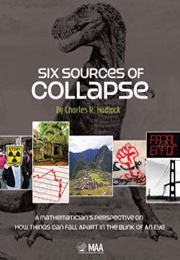 Six Sources of Collapse
Six Sources of Collapse Book contents
- Frontmatter
- Preface
- Acknowledgements
- Contents
- 1 Introduction
- 2 Predicting Unpredictable Events
- 3 Group Behavior: Crowds, Herds, and Video Games
- 4 Evolution and Collapse: Game Playing in a Changing World
- 5 Instability, Oscillation, and Feedback
- 6 Nonlinearity: Invitation to Chaos and Catastrophe
- 7 It's All About Networks
- 8 Putting It All Together: Looking at Collapse Phenomena in “6-D”
- References
- Index
- About the Author
1 - Introduction
- Frontmatter
- Preface
- Acknowledgements
- Contents
- 1 Introduction
- 2 Predicting Unpredictable Events
- 3 Group Behavior: Crowds, Herds, and Video Games
- 4 Evolution and Collapse: Game Playing in a Changing World
- 5 Instability, Oscillation, and Feedback
- 6 Nonlinearity: Invitation to Chaos and Catastrophe
- 7 It's All About Networks
- 8 Putting It All Together: Looking at Collapse Phenomena in “6-D”
- References
- Index
- About the Author
Summary
What is a collapse?
Can you name ten occurrences that you would regard as “collapses”? Just think about this for a moment before reading on.
In case you're having any trouble getting to ten, let's think about categories: civilizations, empires, governments, economies, technologies, industries, companies, species, fads, styles, banks, buildings, bridges, cranes, just to name a few. No problem getting to ten now, right? And if you're getting up in years like me, you can probably recall seeing or hearing about at least ten in almost every single one of these categories, as well as others.
Can you think of any good, i.e., beneficial, collapses? If you grew up in a Western country during the Cold War, then the collapse of the Soviet Union might be one of the first items to come to mind. And then there's the collapse of major diseases such as smallpox and polio, or even the occasional mysterious collapse of cancerous tumors, often not fully understood. There are of course many more.
We may all have slightly different definitions of a “collapse,” but let's use the term loosely to refer to some relatively rapid process that leads to a significant reduction in quantity, quality, or level of organization. For example, we speak of the collapse of the dinosaurs, a process that may have taken up to several thousand years after a likely calamitous meteorite impact that significantly changed the Earth's environment; but this time period is still almost instantaneous when compared with the 160 million year period during which the dinosaurs were the dominant terrestrial vertebrates.
- Type
- Chapter
- Information
- Six Sources of CollapseA Mathematician's Perspective on How Things Can Fall Apart in the Blink of an Eye, pp. 1 - 14Publisher: Mathematical Association of AmericaPrint publication year: 2012
